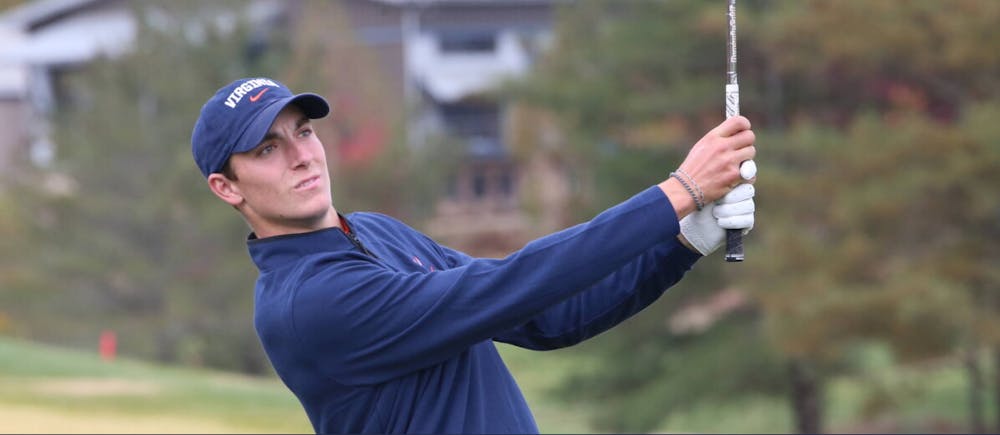No. 16 Virginia men’s golf team competed at the 22nd General Hackler Championship Monday and Tuesday following a fifth-place finish in last year’s tournament. The players traveled to the Dunes Club in Myrtle Beach, S.C. The team earned second place in the 14-team field that included strong opponents such as No. 5 Auburn, No. 29 North Florida and No. 36 Duke.
The Cavaliers’ lineup included freshman Ben James, freshman Bryan Lee, junior George Duangmanee, junior Chris Fosdick and sophomore Deven Patel. Junior Jaron Leasure competed as an individual.
During the first two rounds — both of which were played Monday — Virginia soared into the lead with a 22-under 554 and a two-stroke lead over East Tennessee State. Strangely, some of the highest-ranked teams struggled during the first day, with North Florida in particular sinking to near the bottom of the standings.
James posted scores of 4-under 68 and 7-under 65 in his first two rounds to lead the field at 11-under. He recorded 10 birdies and an eagle during those two rounds and finished with a 31 on the back nine of the second round. James leads the team with an average of 69.22 strokes per round and has placed fourth or better in six of the seven tournaments this season.
Lee also performed well with two rounds of 69 to finish in eighth place at 6-under 138. Duangmanee ended Monday in 17th place at 141 with two rounds under par as well. Patel finished in 22nd, Fosdick in 48th and Leasure in 29th after Monday’s game.
The third round of the tournament began at 8 a.m. Tuesday paired against East Tennessee State and Louisville. Virginia did not perform their best the second day, shooting a 4-over 292 to come in second to the Buccaneers.
James was the only player to score under par for the Cavaliers during the third round with a 2-under 70. He had an eagle on the fourth hole and shot 4-under on the front nine. James tied for first place in the tournament to earn first-place medalist honors for the third time this season. This impressive feat has not occurred since Ben Kohles in the 2009-10 season and Jimmy Flippen in 1991-92.
Both he and East Tennessee State’s sophomore Mats Ege scored 13-under 203. James played especially well on the par 4s with an average of 3.80 strokes, playing them 6-under par which was at least three strokes better than any other player.
Lee and Duangmanee tied for 20th place at 1-under 215 with final-round scores of 77 and 74, respectively. Patel finished in 31st place and Fosdick in 39th. Leisure shot 77 in his third round and placed 45th.
The course was difficult to play on this week, but in comparison to the other teams, the Cavaliers performed especially well on Par 3s, tying for first with a scoring average of 3.21 strokes. The team also had the second most birdies over the three rounds, totaling 58.
Although Virginia did not come in first place, the Cavaliers still had a successful trip to South Carolina. Outside of James, Lee played particularly well Monday, finishing with two scores of 69, two below his season average. Although he struggled Tuesday, it will be key to the Cavaliers’ success for him to emerge as a strong No. 2 player.
Looking forward, the Cavaliers hope to continue their excellent playing at the Linger Longer Invitational in Greensboro, Ga. March 19-21.







